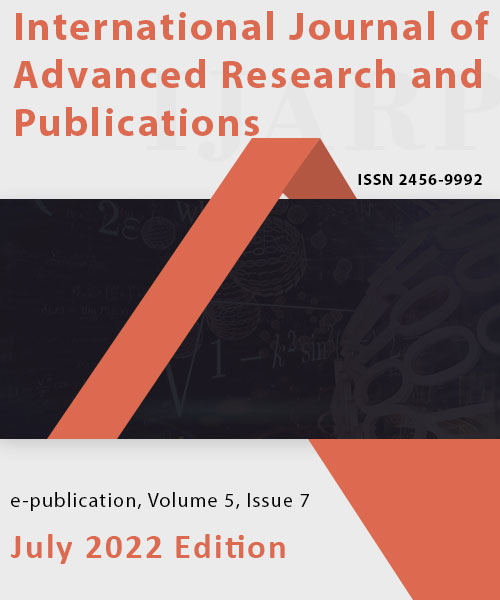Work Relationships Between School Development Committees And School Heads In The Performance Of Their Duties In Selected Zimbabwean Primary Schools
 Volume 5 - Issue 7, July 2022 Edition
Volume 5 - Issue 7, July 2022 Edition
[Download Full Paper]
Author(s)
John Tenha
Keywords
School Development Committee, work relationships, conflict, conflict management.
Abstract
Highly successful primary schools are usually defined by harmonious work relationships that obtain between school development committees and school heads. This is the ideal situation craved by many schools yet it does not happen that way. This led to this study which examined the degree to which work relationships between School Development Committees (SDCs) and school heads influence the performance of their duties in Goromonzi district in Mashonaland East Province in Zimbabwe. The qualitative research approach was employed in this study and the multi-case research design was used. Three primary schools were purposively selected, and from each of these schools the head, deputy head, SDC chairperson and the vice chairperson were selected to be the participants in this study. Semi-structured interviews, observations and document analysis were used to generate data. The responses by participants were audio-recorded then transcribed verbatim. These became the main data for analysis. The findings showed that school heads inducted SDC members on their functions at school following the Ministry of Education, Sport and Culture Statutory Instrument 87 [1] of 1992. It was found out that some SDC members come into office with preconceived ideas that could be detrimental to schools. Conflicts occur in schools and school heads dealt with these amicably to avoid disturbing the development of schools. Though differences in opinions occurred in schools between SDC chairpersons and school heads, it was found out that SDCs were crucial in the welfare of schools as they formed a crucial link between parents and schools. The study recommends ongoing training for SDC members on how to handle school issues. School heads also need training on conflict management.
References
[1]. Ministry of Education, Sport and Culture. Statutory Instrument 87 of 1992. Government Printers. Harare. 1992.
[2]. J. N. Kindiki, “Effectiveness of Boards of Governors in curriculum implementation in secondary schools in Kenya,†Educational Research and Review. 4(5), pp. 260-266, 2009.
[3]. M. J. Salleh, and A. Adulpakdee, “Causes of conflict and effective methods to conflict management at Islamic Secondary Schools in Yala,†Thailand. International Interdisciplinary Journal of Education, 1(1), pp. 15-22, 2012.
[4]. A. Afful-Broni. “Conflict management in Ghanaian schools: A case study of the role of leadership of Winneba Senior High School,†International Journal of Educational Planning and Administration. 2(2), pp. 65-76, 2012.
[5]. T. Mapolisa, and V. H. Mawere, “Effectiveness of school vision and mission in aiding conflict prevention in Bindura Urban Primary Schools- Mashonaland Central Province, Zimbabwe,†International Journal of Social Science and Education, 2(4), pp. 562-577, 2012.
[6]. M. A. Rahim, Managing conflict in organizations (3rd Ed.). Quorum Books, Westport, CT, 2001.
[7]. S. Ranson., C. Farrell., N. Peimc, and P. Smith, “Does Governance Matter For School Improvement? School effectiveness and school improvement,†DOI: 10.1080/09243450500114108. 2005.
[8]. R. Mestry, “The functions of school governing bodies in managing school Finances,†South African Journal of Education. 6(1), pp. 27-38. 2006.
[9]. R. Yin, Case Study Research Design and Methods, (3rd ed.). SAGE Publications, London, 2003.
[10]. K. Klenke, Qualitative research in the study of leadership. (2nd ed.). Emerald Publishing Limited, New York, 2016.
[11]. P. T. Have, Understanding qualitative research and ethnomethodology. SAGE Publications. London, 2010.
[12]. L. Cohen., L. Manion and K.Morrison, Research methods in education. (8th ed.). Routledge, New York, 2018.
[13]. R.C. Bogdan and S.K. Biklen, Qualitative research for education: An introduction to theory and methods (2nd ed.). Allyn & Bacon, Boston, 1992.
[14]. N. A. Salfi, “Successful leadership practices of head teachers for school improvement: Some evidence from Pakistan,†Journal of Educational Administration. 49(4), pp.414 – 432, 2011.
[15]. E. Boonstoppel, Building school-community relations through empowerment of school development committees in Zimbabwe. SNV Netherlands Development Organisation. Harare. 2010.
[16]. J. Nyandoro., J. Mapfumo and R. Makoni, “Effectiveness of school development committees in financial management in Chimanimani west circuit primary schools in Zimbabwe,†Social Sciences and Humanities, 4(1), pp. 255-274. 2013.
[17]. M. I. Yousuf, M. T. Alam., M. L. Sajjad and M. Imran, “Amelioration of educational conditions through school management committees,†Journal of College Teaching & Learning. 7(9), 47-52. pp, 2010.
[18]. L. M. Rhim, Moving beyond the Killer B’s. The role of school boards in school accountability and transformation. Academic Development Institute. Illinois. 2013.
[19]. J. N. Okendu, “The role of school board, school heads and parent- teachers’ association in the effective management of public schools,†Journal of Education and Practice. 3(8), pp, 201- 208, 2012.
[20]. M. A. Dzvimbo, F. Zimhondi., M. Masimba and K. Zhanda, “Beyond the evidence: The conduct of school development committees in Zimbabwe’s education system,†Transatlantic Journal of Multidisciplinary Research, 2(1&2), pp, 95-107. 2020.
[21]. R. Baral., N. Sahu, and V. Meher, “The attitude of teachers and parents of students towards the implementation of school management committee (SMCs) at elementary level,†International Journal of Theory and Application in Elementary and Secondary School Education (IJTAESE), 1(2), 58-74. pp, 2019.
